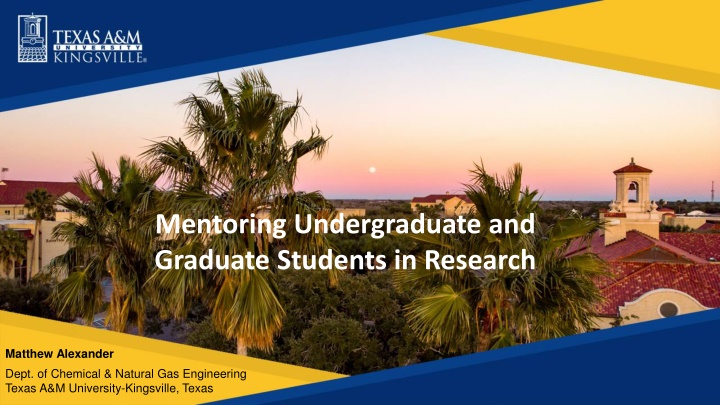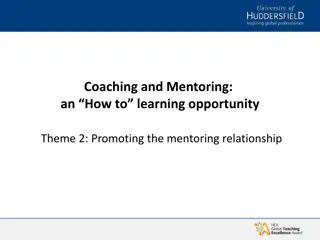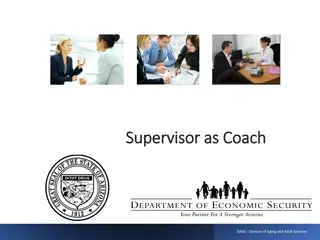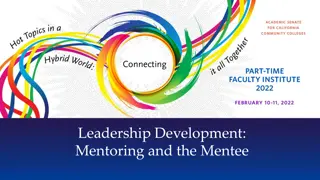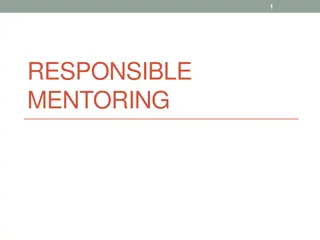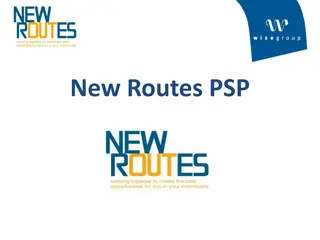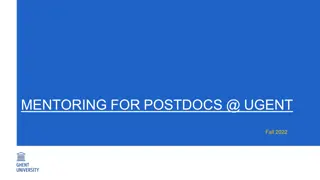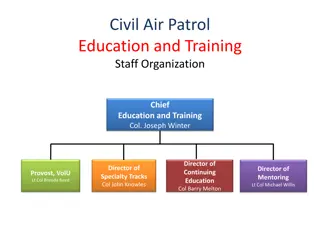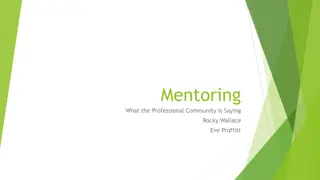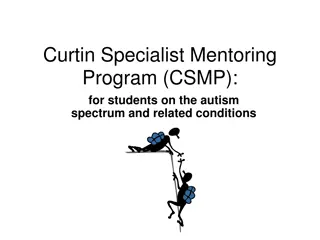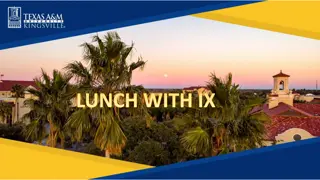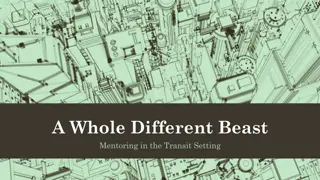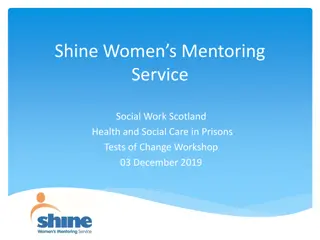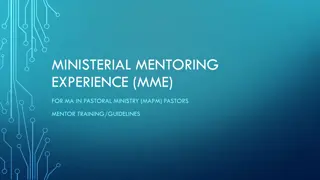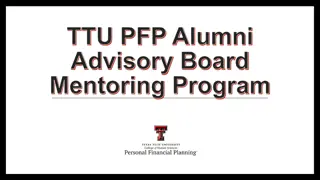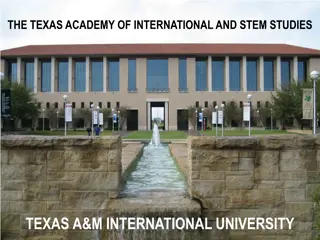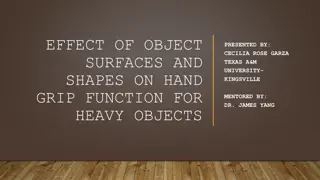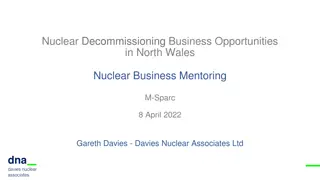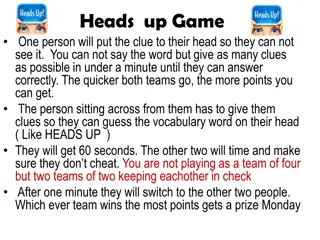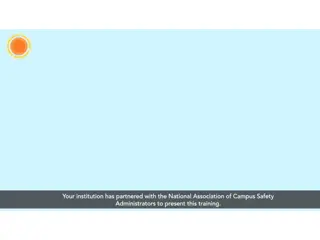Student Research Opportunities and Mentoring Programs at Texas A&M University-Kingsville
Mentoring undergraduate and graduate students in research, Matthew Alexander from the Dept. of Chemical & Natural Gas Engineering at Texas A&M University-Kingsville, Texas, discusses his involvement in student research mentoring programs at TAMUK, including opportunities for undergraduates and graduates, such as NSF grants, McNair Scholars Program, and more. Various structured programs offering stipend support, conference opportunities, and research funding sources are highlighted.
Download Presentation

Please find below an Image/Link to download the presentation.
The content on the website is provided AS IS for your information and personal use only. It may not be sold, licensed, or shared on other websites without obtaining consent from the author.If you encounter any issues during the download, it is possible that the publisher has removed the file from their server.
You are allowed to download the files provided on this website for personal or commercial use, subject to the condition that they are used lawfully. All files are the property of their respective owners.
The content on the website is provided AS IS for your information and personal use only. It may not be sold, licensed, or shared on other websites without obtaining consent from the author.
E N D
Presentation Transcript
Mentoring Undergraduate and Graduate Students in Research Matthew Alexander Dept. of Chemical & Natural Gas Engineering Texas A&M University-Kingsville, Texas
My student research mentoring at TAMUK Undergraduate: ~ 15 undergrad in various TAMUK-sponsored programs, ~10 undergrad in NSF CREST grant; MS graduates: 40 total, 20 MS thesis and 20 MS project; 1 PhD graduate Developed and taught PhD-level course on research methods for new PhD in Engineering program
Student Research Opportunities (High Impact Practice) Undergrad & Grad Methods for Outcomes Research Opportunities Student Mentoring
Research Opportunities for Undergrads McNair Scholars Program (Dept of Ed grant); Centers for Research Excellence in Science and Technology (CREST) NSF grant; Greater Texas Foundation (GTF) grants; Presidential Undergraduate Research Scholars(PURS) program--occasional; TAMUK Council for Undergraduate Research (TCUR) occasional; Research Experience for Undergraduates (REU) NSF grant. All of these programs require the student to seek out a faculty mentor, and for the faculty and student to mutually agree upon a research topic.
Undergraduate Research Opportunities at TAMUK Research Program Program Characteristics Structured program for summer research with stipend support, including prep for graduate school, and conference opportunities McNair Year-round stipend support for research on sustainable water use, including conference opportunities CREST Honors College funding source for fall or spring student research, includes conference opportunities, minimal structure GTF PURS University source for fall or spring research, minimal structure TCUR University source for fall or spring research, minimal structure
Research Opportunities for Grads (prefer research funding support, but not an absolute) Federal or state grant with stipend support directly on research topic; Funded project report providing stipend / wage to student for financial support, but not necessarily on research topic; TA support to student, not related to research; No financial support to student.
How Undergrad & Grad Research Provides Opportunities for Student Development Independent work: progress on the research topic is entirely up to the student, and no one else; Communication skills: listening and conversing with mentor are skills critically important to student s research; oral and written communication of research plans and results is critical to dissemination of the findings; Technical skill development: learning based on support from advisor, but also learn on their own (beyond advisor s knowledge base).
Methods for Student Mentoring Undergrad & Grad Methods for Outcomes Research Opportunities Student Mentoring
Undergrad & Grad Research Mentoring Approach Explain the independent nature of UG research; Set regular faculty-student meeting times; Set expectations for research progress each week, and for longer- term (semester), take into consideration student s other workload(s); Explain the try-fail-retry nature of experimental chemical research; Be accommodating towards prior experience or lack thereof; Take into account student s aptitude (learns fast, or requires remedial efforts?) and personal confidence level
Undergrad & Grad Mentoring Research Steps Define the research topic; Understand literature in the field (literature search); Develop research question; Introduce student to lab or computer model methods; Conduct lab / computer work; Analyze data, prepare final research report and presentation.
Define the research topic---let student have significant input / choice in research topic, which will keep their interest
My Personal Comments I ve seen very wide range of UG and GS capabilities Sophomores with research understanding at MS level MS thesis students with capability at junior undergrad level Because research mentoring is 1-on-1 relationship, each person has different needs and different levels of input required of me Begin by treating all students with respect; do not treat a research student as a commodity to produce expected results in x time.
Outcomes Undergrad & Grad Research Opportunities Methods for Student Mentoring Outcomes
Specific Student Outcomes--Undergrad Prior to graduation McNair and CREST students have won 1st and 3rd place awards at TAMU Pathways, TAMUK Javelina Research Symposium, University Council on Water Resources conference, and the Annual Biomedical Research Conference for Minoritized Scientists Two students had their UG research papers published in the TAMUK Javelina Undergraduate Research Journal; Post graduation Several UG research students have gone on to grad school at Tier 1 universities; Former undergraduates awarded a Fulbright Fellowship Awarded NSF Graduate Research Fellowship Accepted to CMU 5-yr program PhD in Engineering and International Studies
Specific Student Outcomes--Grad Prior to graduation Students have won 3rd place awards at TAMU Pathways, Multiple students have had articles published in peer-reviewed journals Post graduation Several UG research students have gone on to grad school at Tier 1 universities;
Specific Student Outcomes: Failures and Challenges Not all advisor-mentor relationships have positive endings (my personal experiences) Students dismissed by me from advisor-advisee relationship due to major plagiarism violations Students not completing MS thesis prior to leaving for next grad school opportunity Student frustration and desire to quit after not passing thesis proposal or thesis defense Lack of commitment to research effort by undergraduate student 3 years to complete MS thesis My approach to salvage bad situations Treat students with respect Be patient in directing them to recover or fix it and make amends
Conclusions Effective mentoring of student researchers results in Independence, self-reliance; Higher technical skills; Communication skills, especially at higher technical / professional levels; Self-efficacy, self-confidence.
Mentoring Undergrad & Grad Research DISCUSSION What do you personally feel are critical elements or aspects to student research success, that you can impact thru your mentoring? What is a good way to deal with students that struggle with the independent nature of research work (that need lots of hand-holding )? What would you try in the case of impending failure of a research student?
